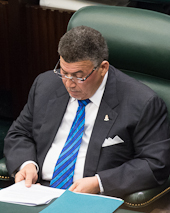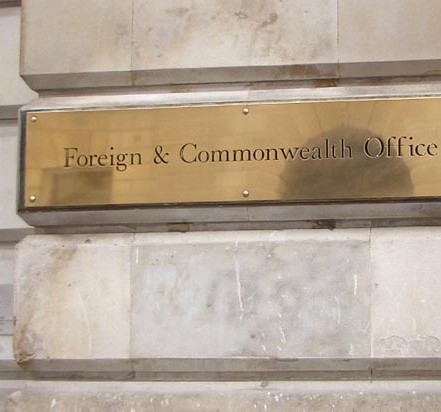 Politics
Politics

New rules coming for PAs
 (CNS): The government is currently working on a new law which will see the rules regarding government companies such as Cayman Airways and the Turtle Farm, as well as the bodies that manage the port, the airport and the Water Authority, follow more standardized practices. Despite being government-owned, these various public entities have functioned separately with their own boards and rules. Many have different recruitment practices, benefits packages and management and accounts systems. But given that more than $114 million of taxpayers’ money goes to these companies and authorities annually to provide services or service debts, the Cabinet wants to regain some control and introduce across the board standards.
(CNS): The government is currently working on a new law which will see the rules regarding government companies such as Cayman Airways and the Turtle Farm, as well as the bodies that manage the port, the airport and the Water Authority, follow more standardized practices. Despite being government-owned, these various public entities have functioned separately with their own boards and rules. Many have different recruitment practices, benefits packages and management and accounts systems. But given that more than $114 million of taxpayers’ money goes to these companies and authorities annually to provide services or service debts, the Cabinet wants to regain some control and introduce across the board standards.
Speaking at a press briefing last week, Premier Alden McLaughlin said the current "ad hoc system" will be changed when the new law moves through the parliament sometime in the New Year, as he pointed to some of the problems with the way that public bodies function.
Government is seeking to remove the random management practices that have characterized some of the agencies and create standard recruitment and HR systems as well as pay and benefits packages for staff.
Government has 25 statutory authorities and government companies and many of them have entirely different management systems from each other and from core government. Marco Archer, the finance minister, recently described them as “a mixture of small, medium and large entities with varying degrees of reliance on financial support from the government”.
The drain on government resources from the Turtle Farm, for example, is well-documented but other entities such as the port and the Maritime Authority, which were meant to be profit making entities, are also facing problems. While others, such as the Water Authority and the Airport Authority, generate income, in some cases the government has lost control of what is happening inside the entities, which has result in significant problems and, according to the auditor general, the serious risk of abuse of public cash.
On top of the various types of problems, regardless of the size or system, their financial performance directly impacts the government’s financial results and the quality of the financial statements.
As a result, Archer said at the government’s professional development course last week that government has already stepped up its scrutiny of the SAGCs in order to ensure that they are “prioritizing the need for improved financial management; improved financial performance; and enhanced accountability for the way they carry out their functions”.
The public authorities all fall under the Public Management and Finance Law, which has some tight regulations and rules, but because they operate as distinct entities, each with separate boards of directors, they have sometimes been in conflict with it and the vision of the government.
“This occasionally results in unintended negative consequences, either in terms of policy direction and or financial performance,” Archer stated, as he explained that the draft bill may seek to better define the roles, responsibilities and autonomy of SAGCs and their relationship with Cabinet.
Archer further stated that government would be planning improvements regarding how all public sector agencies track and report their performance to show exactly how public money is spent.
“It is crucially important that the people of the country are given meaningful reports that allow for the assessment of how well agencies are performing and how that work aligns with the strategy and policies of the Cabinet,” Archer said. “The PMFL has a very complex performance reporting framework that has not worked as envisioned. The current system of Output specification and reporting requires an enormous amount of manual work and does not produce the type of information that Cabinet or the Legislative Assembly needs to properly evaluate agency performance.”
He said that the budget statements produced by government may provide an enormous amount of information but he questioned how useful it was as it does not really show the activities of a given agency or how well it is doing what it should do.
Over 2,000 people work in the 25 public authorities that fall outside of core government and the premier has indicated that his government is keen to see those public employees on morestandardized HR packages, as well as working more on government rather than their board’s policies. He said the bill would create common standards, not just for the financial reporting but in employment as well.

Scepticism raised over government’s accounts
 (CNS): The pat on the back that government was giving itself last week over improvements in the public accounts have not convinced everyone that it is close to addressing the mammoth decade-long failure to account for how it spends tax payers' money. The president of the Chamber of Commerce and the independent member for North Side have both indicated some doubt that the Cayman Islands Government is out of the woods yet, adding to the broader skepticism in the community about the issue, as evidenced by the comments on CNS, social media and other public forum.
(CNS): The pat on the back that government was giving itself last week over improvements in the public accounts have not convinced everyone that it is close to addressing the mammoth decade-long failure to account for how it spends tax payers' money. The president of the Chamber of Commerce and the independent member for North Side have both indicated some doubt that the Cayman Islands Government is out of the woods yet, adding to the broader skepticism in the community about the issue, as evidenced by the comments on CNS, social media and other public forum.
For the first time since the introduction of the Public Management and Finance Law in 2004, the Ministry of Community Affairs and the Ministry of Tourism managed to avoid an adverse opinion or disclaimer. For a decade these and other core government entities’ accounts have been almost un-auditable and the Office of the Auditor General (OAG) has had to disclaim them or give adverse opinions spelling out the catalogue of problems about why the accounts cannot be trusted.
However not everyone has been overly impressed.
Johann Moxam, the president of the Cayman Islands Chamber of Commerce, said that after ten years the revelations that all 41 government entities managed to submit their accounts within the deadline set out in the law and that two managed to get unqualified opinions was some progress but it was only a small step.
"It means the civil servants in those two entities, the Ministry of Community Affairs and the Portfolio of the Civil Service are doing their jobs properly and demonstrating improved accountability, which can be congratulated,” Moxam told CNS. “This is a small step in the right direction. But let's be candid, the Cayman Islands Government has a long road ahead in order to achieve full compliance with the PMFL.”
He said that the goal must be the timely completion of all financial statements submitted without any qualified or adverse opinions by the auditor general and his team.
“A new standard for accountability must be set and the Chamber Council supports every effort by the Ministry of Finance and the Cayman Islands Government to achieve tangible success. Every government needs unqualified and timely financial statements submitted so that they can make informed decisions regarding how to budget, forecast revenues and plan its expenses. We look forward to receiving good news of real progress,” Moxam added.
Ezzard Miller tried in vain when he was chair of the Public Accounts Committee, the legislative body that government bean counters are supposed to report to, to impose sanctions on government accountants who were failing to produce the records. He said he was happy to see that the two entities had finally managed to take the step but said someone still had to take the responsibility to get things right across the board.
“I am hoping that the bragging and the boasting will not reduce the pressure to get it done,” he said. “I think it is really premature and not that much to brag about if only two out of more than 40 have managed to get it right. Perhaps had it been the other way round government may have had something to really brag about.”
Miller noted that the government announcement came outside the normal process of the reports as it should have come via the auditor to the PAC and he wondered if government was grasping the potential good news ahead of what will be more bad news from the auditor once his work was done.
CNS has contacted the OAG for comment regarding the government’s claims that two ministries for the first time in ten years managed to get one qualified and one unqualified audit after years of disclaimers. We are awaiting a response and confirmation that he has written to the deputy governor lauding the progress.
See related story on CNS: CIG-brags-clean-audits

CIG brags of clean audits
 (CNS): Government bean counters in one ministry and in the portfolio of the civil service have been given a clean bill of health for their 2013/14 accounts. All government accounts were submitted within their legal time frame and for the first time in a decade the tourism ministry also managed to get a qualified opinion rather than a disclaimer or an adverse opinion. Although this is exactly what government should be doing across all 41 reporting entities, every year, the fact that the public accounts had reached such a dire situation the premier said it was important to tell the country, Wednesday, that this government meant business when it came to straightening out the problem.
(CNS): Government bean counters in one ministry and in the portfolio of the civil service have been given a clean bill of health for their 2013/14 accounts. All government accounts were submitted within their legal time frame and for the first time in a decade the tourism ministry also managed to get a qualified opinion rather than a disclaimer or an adverse opinion. Although this is exactly what government should be doing across all 41 reporting entities, every year, the fact that the public accounts had reached such a dire situation the premier said it was important to tell the country, Wednesday, that this government meant business when it came to straightening out the problem.
Although the auditor general’s office has only been able to complete just over half of the government’s accounts that came in from over 40 different entities for this financial year, government bragged that they were all in before the statutory deadline and the quality of all of them was vastly improved.
This led the deputy governor, Franz Manderson to optimistically boast that he believed all of the accounts, once audited by Alastair Swarbrick’s team, would, this year finally, receive at least a qualified if not unqualified opinion. The finance minister however was more realistic and told CNS that it would probably not be until the 2014/15 financial year that government could get a complete clean bill of accounting health.
Admitting there was still a lot of work to do Premier Alden McLaughlin, explained why he had called a press briefing to announce the improvement in the accounts situation. "A lack of proper accounts has haunted three administrations and we are starting to get it right."
He said an email sent to the civil service management from the auditor general commended the various entities for the results so far. the premier stated that it was the first time since the introduction of the public finance management law in 2004 the ministry of community affairs got an unqualified opinion and the ministry of tourism a qualified one and this alone was a significant step forward. This means that in both cases when the public finally get to see the reports, when they are tabled later this month, they can trust the information in them as an accurate report of what those ministries did with public cash last year.
“Over the course of the past seven or so years there has been much justified criticism about the failure of the Cayman Islands Government to comply with the Public Management and Finance Law with respect to its accounts,” McLaughlin said as he opened the televised conference to boast of the forward step.
“Finally there is some good news from the Auditor General about the progress that this Administration is making on getting our accounting system up to scratch,” the premeir added.
Only weeks after Swarbrick and his team published a damning review of where government is on its accounts backlog McLaughlin said the government had now received “favourable and complimentary words” from the auditor.
Although government has gone effectively from a complete failing grade when it comes to reporting its public finances and accounting for how it spends tax payer’s money to a D+, the premier stated that the previous appalling situation made this progress all the more significant.
“We still have a ways to go, but in the words of the Auditor General, this is the best result that has been achieved since the introduction of the PMFL,” the premier said. “While we appreciate that government still has a lot to do when it comes to submitting financials in a timely manner and getting them right the first time, I honestly believe this Administration is setting the right tone,” he added.
Thanking civil servants and commending them for their work the government leader said they had “spent many hours striving to get our financial statements and reporting up to par,” as he described a new attitude of cooperation and responsiveness across government as it works with the auditor general’s team.
“This is not by chance, but by design. This government has worked tirelessly since being returned to office to restore stability to the country and the economy,” the premier stated. “A large part of that work has been overseen and ushered through by Finance Minister Hon. Marco Archer. I again commend him and his very capable team for the infectious zeal they bring to their government duties.”
Despite the minor move forward and the remaining massiveproblems surrounding accountability to the public for billions of dollars past spent and unaccounted for, the premier said his administration would “continue to move forward and strive for improvement.”
McLaughlin believed it was worth celebrating what he saw as significant improvements that have been made in the accountability for the use of public resources.
CNS contacts the auditor general’s office about the claimed improvements and the current situation with the accounts for 2013/14 and we are awaiting a response.

Constitution review extensive
 (CNS): Although the premier recently gave the impression that the review of the constitution and the subsequent recommended changes are relatively minor and administrative, a detailed table of the 34 suggestions reveal that some of them are in fact substantive. It is understood that the opposition leader believes that there is a need for a referendum on some of these proposals which the review team have recommended and it is clear that some are much more than administrative. Issues such as how a person qualifies to vote or become a member of the Legislative Assembly to the question of free education for all children and the age of judges are some of the subjects proposed for change.
(CNS): Although the premier recently gave the impression that the review of the constitution and the subsequent recommended changes are relatively minor and administrative, a detailed table of the 34 suggestions reveal that some of them are in fact substantive. It is understood that the opposition leader believes that there is a need for a referendum on some of these proposals which the review team have recommended and it is clear that some are much more than administrative. Issues such as how a person qualifies to vote or become a member of the Legislative Assembly to the question of free education for all children and the age of judges are some of the subjects proposed for change.
The review was completed last month and the chair of the review team and constitutional commission David Ritch wrote to the governor, the premier, the opposition leader and the joint team leader of the overseas territory directorate in the Foreign and Commonwealth Office, regarding its findings. Both that letter and the table of recommended changes have now been published on the Constitution Commission’s website.
The review did not engage in a public consultation regarding the potential constitutional clean-up but Ritch said the Commission has included comments received from various other parties. It has identified 34 elements that the chair said were “sufficiently important to warrant being considered for amendment.”
The commission also believes that changes can be made without the need for a referendum but it was ultimately for premier and leader of the opposition to decide whether they can agree to the amendments without going to the polls but it appears that they go beyond the concept of administrative changes.
In a letter to the then premier, McKeeva Bush in 2009 the FCO minister at the time responsible for the overseas territories, Chris Bryant, confirmed that any changes to the constitution had to be made after a referendum unless the changes were agreed as minor or uncontroversial by both the premier and the opposition leader.
The Commission has recommended that the leaders form a committee to consider the potential changes and how to make them. However, it is understood that the opposition leader has already indicated that he doesn’t believe the proposed changes are all minor and that a referendum will be required. As a result of the difficult in phrasing the questions regarding the potential changes and the cost of a referendum government will be hoping to avoid the need for a vote.
If Premier Alden McLaughlin and Bush cannot agree on what can be changed then the proposals will need to be put to the national vote or the changes won’t be made. Although extensive and in some case significant the changes are not necessarily controversial and have arisen after the document has been in use for some five years and the inadequacies or ambiguities have come to the fore.
However, without agreement of the country’s leading political figures the necessary amendments won’t happen without a vote.
See details of the recommendations below

LA waits on governor to form boundary commission
 (CNS): Work on the country’s move towards one man, one vote in single member constituencies is expected to begin shortly as the governor is considering a minute from the Legislative Assembly to create a boundary commission. A three man panel consisting of a chair appointed by the governor and a member selected by the opposition and one by government will undertake an assessment of the local political landscape. Given the remit to examine the proposed boundaries for single member constituencies after a government motion debated and passed in September the commission will follow on from the work of the 2010 team and prepare Cayman for the new voting system in time for the 2017 national poll.
(CNS): Work on the country’s move towards one man, one vote in single member constituencies is expected to begin shortly as the governor is considering a minute from the Legislative Assembly to create a boundary commission. A three man panel consisting of a chair appointed by the governor and a member selected by the opposition and one by government will undertake an assessment of the local political landscape. Given the remit to examine the proposed boundaries for single member constituencies after a government motion debated and passed in September the commission will follow on from the work of the 2010 team and prepare Cayman for the new voting system in time for the 2017 national poll.
It is not bound by a specific number of seats though government has not instructed the commission to increase the membership of the LA. The main goal of the commission is to ensure that the constituencies are similar sizes and that they adhere to historical district boundaries. Although North Side, East End and the two constitutionally mandated constituencies of Cayman Brac and Little Cayman will fall well short of the approximate 1000 or so voters in the other fourteen constituencies’ they are expected to remain as they are.
The other fourteen seats in Bodden Town, George Town and West Bay are expected to broadly follow boundaries of the polling station areas that have been used during the last two elections.
Any significant changes to the current layout of polling stations as the guide to the new landscape are likely to occur on the borders between what was once the George Town constituency boundary and Bodden Town, which remains Cayman’s fastest growing district.
According to the elections office website the latest official figure on 20 October reveals 18,323 registered voters with Bodden Town now having passed West Bay by around 350 people. However George Town still dominatesthe voter’s register with 7389 people registered to vote in the capital.

Planning law trouble
 (CNS): A package of changes to the planning law saw the independent members railing against them in the Legislative Assembly this week. The MLAs said the amendments would help big developers but do nothing to assist locals. The restrictions on objections to development, along with the removal of polling for major projects and giving the minister the ability to waive fees and give concessions, while imposing new fees on small homeowners, among other issues, were described as “an abomination” by the member for East End. While the independent members won an important victory to get the regulations approved by parliament, the changes will still have far reaching negative implications, they warned.
(CNS): A package of changes to the planning law saw the independent members railing against them in the Legislative Assembly this week. The MLAs said the amendments would help big developers but do nothing to assist locals. The restrictions on objections to development, along with the removal of polling for major projects and giving the minister the ability to waive fees and give concessions, while imposing new fees on small homeowners, among other issues, were described as “an abomination” by the member for East End. While the independent members won an important victory to get the regulations approved by parliament, the changes will still have far reaching negative implications, they warned.
Described the changes as a package of measures to modernize the law and improve efficiency, Planning Minister Kurt Tibbetts removed significant chunks of the law and transfer them to the regulations. He also repealed a number of important restrictions and requirements that had helped to control major developments. The removal of polling people around an area where a developer is making an application for a major project and the power of the planning minister to change the law to accommodate a developer as he sees fit, were described as very worrying.
Although changes to the planning regulations will now require the approval of parliament and not just Cabinet, the significance of the changes to the law and the placement of many elements in those regulations still caused immense concern. MLAs Arden McLean (East End)and Ezzard Miller (North Side) warned that the changes had gone virtually under the radar of public attention and were verydangerous.
Ahead of the vote, government confirmed it was repealing a change made by the previous government that had placed the power to make and change regulations with Cabinet, returning the power to the Legislative Assembly. But the government still made significant transfers from the law to the regulations that have not yet been made public.
Convinced there was an ulterior motive, McLean said he wondered who was driving the changes. He said all of them were beneficial to major developers and the ones that impacted local smaller property owners were detrimental.
“The country doesn’t derive anything from these large developments,” he said. When the UDP entered into the development agreement with Dart, ultra vires of the law, Cabinet did not have the right to waive the infrastructure fees, but they did, he said. “The public purse lost tens of millions of dollars as a result,” McLean added.
The East End member said that the country had had a runaway government with the UDP and now had another one with the coalition, and he wondered if it was entering into a new “giveaway deal with Dart.” He asked, “Who is pushing these changes? There are no secrets in this country.”
McLean said he wanted to find out who would benefit but that the record of public consultation for the bill may reveal that. “Perhaps we will know.”
He made it clear he believed there was an agenda for major developers to make it easier for them to do what they wanted without due consideration to Cayman’s needs or the costs to the wider community.
“This is some dangerous piece of legislation and this is going to cause problems in the country,” he said, warning that with the zoning flexibility the law was facilitating people would be making applications for commercial activity in the heart of residential neighbourhoods. But, he added, homeowners would be restricted from objecting.
“It should never be case that after you develop in a residential area that someone can come and develop a use clearly contrary to that without getting the consent of the people,” McLean said.
Blaming Opposition Leader McKeeva Bush as well, McLean pointed to the ForCayman Investment Alliance with Dart and said Bush had started “this rubbish we have to face today … with this substance over process to stimulate the economy”.
McLean pressed the point that he believed everything to control large development was being removed, creating “a free for all for large developments”, which gave regular people nothing.
“We don’t benefit; we just get the strain on the infrastructure to accommodate these large developments. They need to pay for the strain and the enhanced infrastructure required to operate it but when we waive the fees there is nothing left to pay.”
Ezzard Miller also raised concerns about who the amendments were designed to help. He pointed out that parliament was supposed to oversee planning matters to protect the people’s interest and government’s institutions were failing. With the repeal of these protections for big developers, he asked what possible assurances he could now give his constituents that their interest was being protected.
“This country should have a proper development and economic plan and any investor must meet the requirements. It cannot be right for us to pass legislation … that the Cabinet can change to suit a developer,” he said. “If we have to waive so many fees to make a development profitable to the developer, than we don’t need it.”
Miller said there was no benefit to locals from most major developments that do not create local work but generate more work permits. Even worse, as a legislator, he would be forced to vote more taxes to pay for the extensive infrastructure support these developments requirewhen fees are waived.
As both members pondered the source of the changes and implied it was for Dart, the islands’ largest developer, investor and land owner, the premier categorically denied the allegations.
During his contribution to the debate Alden McLaughlin said the package had nothing to do with the struggling Dart negotiations. He took aim at McLean for the accusations he was making and attack on the integrity of the government, and in particular the planning minister.
Although the draft of the planning law amendments went through the 21 day public consultation period during Thursday’s committee hearing, the bill went through a catalogue of changes and the new draft is not yet available to the public.
See original amendments below.

Dart battle continues
 (CNS): Despite recent indications by Premier Alden McLaughlin that the Dart negotiations over the provisions and concessions the developer was given under the controversial NRA Agreement were heading in the right direction, he made it clear Wednesday it was a tough and on-going battle. During a debate on amendments to the planning law, which stirred up trouble between the premier and his former colleague, Arden McLean, in the Legislative Assembly, the country’s leader said the legislative changes had nothing to do with more favours for that developer. Government was continuing to renegotiate the “difficult and troublesome elements” of the deal, he said.
(CNS): Despite recent indications by Premier Alden McLaughlin that the Dart negotiations over the provisions and concessions the developer was given under the controversial NRA Agreement were heading in the right direction, he made it clear Wednesday it was a tough and on-going battle. During a debate on amendments to the planning law, which stirred up trouble between the premier and his former colleague, Arden McLean, in the Legislative Assembly, the country’s leader said the legislative changes had nothing to do with more favours for that developer. Government was continuing to renegotiate the “difficult and troublesome elements” of the deal, he said.
The agreement withDart, the islands’ dominant investor, landowner and developer, which was signed by former premier McKeeva Bush in December 2011, has stirred up controversy since it was first announced, from the closure of the West Bay Road to the 50% concessions on all room tax from hotels that Dart will build now and in the future.
In the LA yesterday a further row erupted during the debate over the planning law amendment bill.
The member for East End accused government of making changes to facilitate big developers and continue what the UDP had started with the Dart deal, which he said was a sell-out for the country. McLean had suggested it was no coincidence that, as Dart confirmed plans to build yet another hotel on Seven Mile Beach, the planning law changes were being made that would facilitate him and other big developers but would penalise the small local landowner.
McLaughlin, however, hit back at McLean and accused him of falsely impugning his former colleagues with whom he once “broke bread” and questioning their integrity. The premier said the comments were “scandalous” and he should have tempered his contribution so as to be “more befitting of a veteran member and a friend and colleague” of the members who sit on the government bench.
The premier said it was no secret that they had been dissatisfied with certain elements of the NRA agreement and noted that the government was still trying to re-negotiate the amendments to that. The proposed planning law changes had nothing to do with the Dart agreements, he stated.
McLaughlin insisted that the legislative amendments were put forward by the technical team at the planning department and were described as necessary improvements to the process to make the law more viable and better able to attract positive development.
He said that all governments give concessions to developers in order to encourage them to build and construction was particularly important to Caymanians because that was where the jobs for local people were created.
“I can assure the public that the only motivation of the bill is to improve the development and planning process, to get good solid development started and provide jobs,” the premier stated as he defended his Cabinet colleague, Kurt Tibbetts, who brought the amendments yesterday. “It is not about the big developer versus the little person; it is to ensure that everyone has an opportunity to get a job and get ahead and get Cayman back to where we were before the bottom fell out of the financial market.”
Negotiations over the deal, which many believed was weighed heavily in favour of the developer, were underway almost from the beginning. An independent report raised questions about the value for money and amendments to the deal were agreed. But talks broke down about the details of the amendments and as the former interim government attempted to claw back some benefits for the Caymanian people ahead of the general elections in 2013.
Dart then pulled all the previously agreed amendments and reverted back to the original deal.
However, only half of the West Bay Road that Dart wanted to adapt to turn his land into beach front property has been closed and handed over to the developer. At this point government continues to talk with Dart, who is pressing ahead with a new hotel and condo development on the site of the former Courtyard Marriott. Despite indications that things were improving, there is no new deal yet and at present Dart will, among many other concessions, receive a fifty per cent rebate on the accommodation tax for all of his new hotels, and condos.
Check back to CNS for more on the planning law changes later.

Mac hits out at auditor
 CNS): The opposition leader has attacked the auditor general, following the damning reports released earlier this month that pointed to a catalogue of problems with the public finances at McKeeva Bush’s former ministry. Bush said Alastair Swarbrick had deliberately “smeared” the civil servants working in the tourism and finance ministry, accusing them of incompetence when it was staff shortages that had led to the financial failures. Demanding an emergency Public Accounts Committee meeting, Bush railed against his auditing nemesis and accused him of trying to undermine the public sector workers by releasing reports to the public without giving people a chance to defend themselves.
CNS): The opposition leader has attacked the auditor general, following the damning reports released earlier this month that pointed to a catalogue of problems with the public finances at McKeeva Bush’s former ministry. Bush said Alastair Swarbrick had deliberately “smeared” the civil servants working in the tourism and finance ministry, accusing them of incompetence when it was staff shortages that had led to the financial failures. Demanding an emergency Public Accounts Committee meeting, Bush railed against his auditing nemesis and accused him of trying to undermine the public sector workers by releasing reports to the public without giving people a chance to defend themselves.
Bush went on the attack in the Legislative Assembly Wednesday morning, as he dismissed the accuracy of the audits. This is not the first time that Bush, who is deputy chair of the Public Accounts Committee, has attacked the auditor general.
His disparaging comments about the independent public finance watchdog had led to the chair of PAC asking for Bush to step down. Earlier this year Roy McTaggart write to Bush pointing out that the comments he was making about Swarbrick and his team made it impossible for them to work together. Despite the request, Bush said he would not resign.
McTaggart was travelling overseas and was not present when Bush made his damning statement but the PAC chair told CNS via email that he would address the situation on his return, though it is not clear if he would be calling on his legislative colleagues to reconfigure PAC.
During his statement Bush blamed staffing problems, given the size of the ministry (which he created, having taken on a number of portfolios on top of his premiership), as well as the IRIS accounts system used by government. He said his ministry’s accounts, like everyone else’s, had been transferred into the system without being audited, so the historical failures and mistakes were carried over year on year. .
He also said a costly task force, formed in 2009 to assist, wasn’t much help as the budget was exhausted before it got to his ministry. This issue of staffing problems was also highlighted during the opposition leader’s trial last month, when witnesses stated that they were unable to keep track of Bush’s credit card use because they were so short staffed and under pressure to complete the accounts.
In a bizarre twist, given the failure of most ministries to supply information for audit, Bush turned on the Office of the Auditor General (OAG), saying that senior management only became aware of financial problems after a full audit. So because the financial years in question were not completed until 2013, it was too late for public sector bosses to make improvements.
However, the problems of financial accounting have been highlighted by the OAG for more than six years and were first brought to light, and ignored, by the previous auditor, Dan Duguay.
Nevertheless, despite the long history and concerns raised by the audit office for many years, Bush accused Swarbrick of sensationalized statements about the accounts and no regard to impact on staff. He was “hell bent” on making civil servants and politicians look bad, Bush said, as he called on McTaggart to organize a PAC meeting quickly so they could defend themselves.
Whenasked for comment on Bush’s latest attack, the OAG said it did not wish to comment at this time on Bush’s accusations.

CIG accounts need one leader
 (CNS): The former chair of the Public Accounts Committee (PAC) said that the problem with the public finances is because despite all efforts to address it government has failed to appoint one person to lead and take responsibility for it all. Ezzard Miller said that when public servants who have failed to deliver continue to be promoted and are not being held accountable it is impossible to correct the problem. He said government had to appoint a single capable and qualified individual internal auditor to take full responsibility for the government’s accounts and it was time for those who had failed to get fired.“It is amazing that they can get away with it,” the outspoken North Side member told CNS in the wake of the most recent damning reports from the Office of the Auditor General.
(CNS): The former chair of the Public Accounts Committee (PAC) said that the problem with the public finances is because despite all efforts to address it government has failed to appoint one person to lead and take responsibility for it all. Ezzard Miller said that when public servants who have failed to deliver continue to be promoted and are not being held accountable it is impossible to correct the problem. He said government had to appoint a single capable and qualified individual internal auditor to take full responsibility for the government’s accounts and it was time for those who had failed to get fired.“It is amazing that they can get away with it,” the outspoken North Side member told CNS in the wake of the most recent damning reports from the Office of the Auditor General.
He pointed out that government had spent almost a million dollars on consultants and outside support but had still not reached the point where it could account to the people for spending their money. He said the failure to see any real improvement in transparency was the lack of a single qualified, responsible leader who would be accountable.
During his tenure as chair of the Legislative Assembly committee which deals with public accounts he had attempted to hold civil service bosses accountable via the Public Management and Finance Law but he had been told by the director of public prosecutions that the PAC had no authority to bring a complaint and that only the financial secretary could press for legal action, according to the law.
However, Miller said the financial secretary has been a part of the failing process and as a result had not taken the necessary legal action to force some accountability for the decade-long failure of government to answer to the Legislative Assembly, and in turn the public, for the cash they spend and what is gradually emerging as significant misuse and abuse of tax payers' money.
Miller said that in order to get the accountability and force the hand of those responsible for managing public money there had to be one leader who takes responsibility and who is vulnerable to prosecution for failure, otherwise the problem will, despite constant reassurances, continue.
The distant hope of producing timely consolidated accounts, he said, would remain, as government continued to play catch-up and focus on pulling consolidated accounts together for past years when their eventual delayed publication would render them useless.
Miller said the government had to turn its attention to releasing the most up-to-date set of financial statements even if they were based on unaudited figure that could be corrected down the line.
“If the reports are not timely, government and the Legislative Assembly cannot make adjustments for the next financial year, so the reports are a waste of time,” he added.
The significant lack of general control by many government departments was revealed by the auditor in his latest report on the financial years 2011 and 2012 but this waste, misuse, potential abuse and what appears to be theft in some cases was identified and made public well after the fact.
At the time money was being allocated to those same failing departments the public and the politicians voting the appropriations were completely unaware of the potential risk to the public cash they were voting.
Miller warned that despite the ongoing assurances and promises about changes in personnel and the system, from the current finance ministry, he said he was still concerned that the failures would continue because there was still no real accountability and no leader in place.
See the auditor general’s reports below that catalogue a damning account of the state of public finances.

UK blamed for lifers’ tariffs
 (CNS): The opposition leader, the member for East End and government’s veteran back bencher for Bodden Town all railed against the UK last week during the Legislative Assembly debate on the conditional release bill. The new law, when it comes into force, will, among other things, introduce a tariff system for prisoners serving life sentences. This means that anyone convicted of murder, which calls for a mandatory life sentence, will now have a possibility of parole once they have served an estimated thirty years. However, many members were unhappy about the change and blamed the UK for imposing this new regime for lifers.
(CNS): The opposition leader, the member for East End and government’s veteran back bencher for Bodden Town all railed against the UK last week during the Legislative Assembly debate on the conditional release bill. The new law, when it comes into force, will, among other things, introduce a tariff system for prisoners serving life sentences. This means that anyone convicted of murder, which calls for a mandatory life sentence, will now have a possibility of parole once they have served an estimated thirty years. However, many members were unhappy about the change and blamed the UK for imposing this new regime for lifers.
Arden McLean suggested Cayman was “enslaved in the colonial system” and perhaps the time had come “to part ways so we can be in control of our own destiny".
Although most members in the House supported the bulk of the law, which also deals with the management, rehabilitation and supervised release of all offenders, some were concerned that those serving full mandatory life sentences would no longer necessarily die in jail.
The current government has introduced the tariff system to comply not only with Cayman’s Constitution and its Bill of Rights but with the international treaties signed by the UK. The FCO had also made it clear that either CIG dealt with the question of possible parole for lifers or it would impose the tariffs.
McLean expressed his concerns about the fact that local politicians are not in control. He said it took him a long time to come to terms with that because he had entered politics to make a difference but learned that there was in reality little he could do, since Cayman had others who were “masters of our destiny". McLean also raised concerns about liberal judges and those who, he said, would “let their friends" out of jail.
Meanwhile, Opposition Leader McKeeva Bush also blamed the FCO and expressed his concerns. He added, “We are living in perilous times.”
Bush said he believed in human rights but he also believed in an eye for an eye. Bush said that crime had increased since the abolition of the death penalty in Cayman, which he said was also forced upon the country by the UK. The opposition leader questioned whether or not 30 years was enough to punish or deter cold blooded murderers.
Railing against what he said were the double standards of the British, he pointed to discussions in the UK about imposing a life sentence without parole for people who kill police officers. Bush said the UK was taking away Cayman’s choice and he believed that criminals would take advantage of the human rights obligations that government had. He said that although he appreciated the position government was in and supported the rest of the bill, he could not support the introduction of a 30 year tariff for life.
The Progressive’s veteran politician, Anthony Eden, the deputy speaker and first elected member for Bodden Town, was also scathing about human rights as he too railed against the UK and the enforced abolition of the death penalty and now the opportunity for killers to be released.
“We have got to stop the mollycoddling of criminals,” he said, adding that he believed people werescared to come out of their homes. He took aim at the police and questioned what the law enforcement agencies were doing and said the “pussyfooting around” had to stop. Eden said that when he saw what was happening, he had to wonder about the UK's agenda regarding the Cayman Islands.
“They come at us with so many different angles … we can’t seem to satisfy these people,” he said, referring to the British government.
Eden lamented the amount of money spent on prisoners and said he wished the same amount of time and money could be given to the elderly and those who were in need.
Although the members who spoke during the debate on the bill focused on the 30-year starting point tariff, the term served by anyone given a life sentence will not, in fact, be limited to 30 years. In the first instance, judges will have some flexibility to increase or decrease the tariff according to the extenuating or mitigation circumstances of the cases that come before them.
Once a tariff is set, that indicates the minimum term that the offender must serve before he can be considered for possible, but by no means certain, release. The lifer will then appear before the Conditional Release Board, and if they believe he is still a risk to the community in any way, he will remain in jail — and that could mean for the rest of his life. Only if all things point towards successful rehabilitation will the board set a release date.
Lifers will, however, remain under supervision for the rest of their lives, and should they commit an offence of any kind, they will be returned to jail and may still serve the rest of their days behind bars.
The change in the life sentence will address the section of the Bill of Rights which deals with cruel and inhumane treatment. The idea of sentencing someone to life in prison without any hope of every being released is considered torture.
In addition, experts say that when there is no hope of release and nothing to lose, rehabilitation and control of inmates can be difficult.
See related story on CNS: Lifers get 30-year tariffs